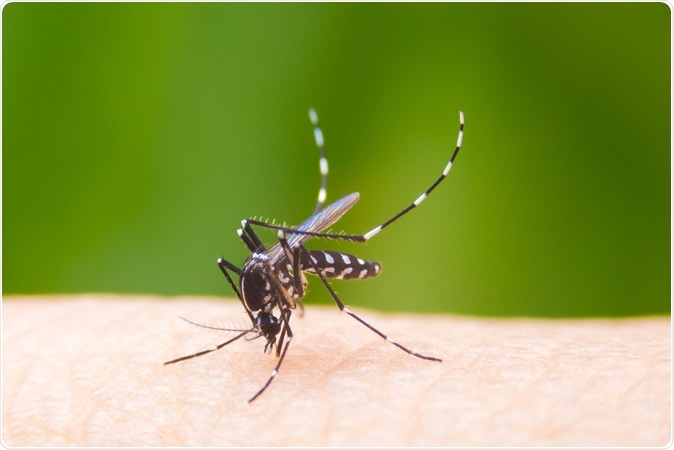
New study suggests bacteria-loaded mosquitoes may halt spread of Dengue fever
Dengue fever stopped spreading in the Australian city of Townsville after an army of mosquitoes infected with the Wolbachia bacterium were released. Indeed, when a natural bacterium called Wolbachia infects the dengue-carrying mosquito species Aedes aegypti, it stops viral replication inside the mosquito and thus breaks the cycle of transmission.

Aedes aegypti mosquito on human skin. Image Credit: khlungcenter / Shutterstock
The million-dollar question is, will these viruses or mosquitoes eventually become resistant to Wolbachia or not? If resistance emerges, the whole Wolbachia exercise becomes pointless.
A new study aims to provide a preliminary answer to this question. The researchers used a dengue virus strain to infect two categories of mosquito cell - one infected with Wolbachia and the other uninfected. The Wolbachia bacterium naturally infects half of all insect species, but is not naturally found in many mosquito vector species. The study titled 'Sustained Wolbachia-mediated blocking of dengue virus isolates following serial passage in Aedes aegypti cell culture', was published in the journal Virus Evolution on June 8, 2019.
After five days the replicated viruses were introduced to fresh cells, beginning the next cycle of infection. Nine cycles were completed in this manner. At the end, the number of viruses was counted in each of the two types of cell cultures. They also tested the viruses from each culture for their replicative capability using fresh cells of each type.
Normally, the dengue virus, like most viruses, hijacks the mosquito cell’s machinery to replicate itself, making millions of viral particles. Finally it destroys the host cell or buds out of it, to release the new viruses.
Wolbachia-infected mosquito cells showed an exponential drop in the numbers of dengue virus. In some cases the virus died out altogether. However, Wolbachia-free cells showed a stable high number of viruses.
Viruses collected from Wolbachia-infected cells were unable to successfully replicate even in Wolbachia-free cells. Thus Wolbachia acts rather like a vaccine, stopping viral multiplication inside the mosquito host. This is called the “pathogen-blocking effect”. The mechanism of blocking remains unclear.
Researcher Beth McGraw explains, “We think it might have to do with competition between Wolbachia and the virus for physical space (inside the cell) or for nutrition they both need from the mosquito. Or it could be that Wolbachia is increasing the immune capacity of the mosquito.”
The dengue virus causes millions of dengue fever cases in the tropics. Beginning with fever, body ache and nausea, it may lead to life-threatening complications like dengue hemorrhagic fever, with widespread internal bleeding and organ failure.
Many traditional methods of dengue control have failed for a variety of reasons. For one thing, Aedes aegypti feeds in the daytime, so using bed screens at night doesn’t prevent dengue. It breeds in stagnant water, which is abundantly present in urban settings that present multiple challenges to insecticide spraying and to the removal of standing water.
This is why virus biocontrol using Wolbachia holds great appeal. One, it can control multiple types of dangerous mosquito-borne viruses. Secondly, uninfected female mosquitoes cannot breed with male infected mosquitoes, reducing breeding rates. Instead, Wolbachia is transmitted by infected female mosquitoes to their progeny, producing more and more infected mosquitoes with each generation.
Thirdly, as the current study shows, neither the mosquito nor the virus was able to develop resistance to the bacterium after nine cycles of replication.
“I am continually surprised by Wolbachia," said McGraw. "I thought we would get dengue variants that would evolve resistance. Wolbachia is doing a better job than I expected at controlling virus replication in cells.”
While the study holds immense promise for the prevention of mosquito-borne diseases like dengue, more work remains to be done. For one thing, this was an in vitro study, using mosquito cells rather than the whole insect, which may react quite differently. Secondly, the huge mosquito populations in the real world offer far greater opportunities for acquired resistance than the limited laboratory cell populations.
Scientists are now releasing Wolbachia in larger volumes into the mosquito population in tropical and subtropical countries, to test its effects on human dengue fever rates. This could allow resistance to occur, especially when the virus finds human or uninfected mosquito hosts.
"I think our study suggests that the evolution of resistance to Wolbachia in the virus is challenging," said McGraw. "I don't think it's a guarantee that the virus is not going to evolve under field conditions because the natural system is much more complex. The real experiment is being done in the field right now, because Wolbachia has been released into communities in Australia, Indonesia and Brazil, among others. Monitoring in release areas will be needed to test for the emergence of resistance in the virus."
Source:
Koh C. et al., (2019). Sustained Wolbachia-mediated blocking of dengue virus isolates following serial passage in Aedes aegypti cell culture. Virus Evolution. https://doi.org/10.1093/ve/vez012






















.png)












No hay comentarios:
Publicar un comentario